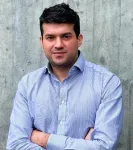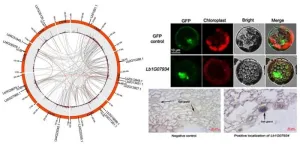Researchers led by Ludwig Lausanne’s Matteo Morotti, Alizee Grimm, Denarda Dangaj Laniti and Director George Coukos report in the current issue of Nature their discovery—based on analyses of data and samples collected in TIL-ACT clinical trials—of the mechanism by which the lipid, prostaglandin E2 (PGE2), poisons TIL metabolism to serve as a checkpoint against their anti-tumor activity. They also show that disrupting that mechanism during the cell culture processes employed in TIL-ACT dramatically improves the therapeutic potential of transferred TILs in mouse models of cancer.
A companion study led by researchers at the Technical University of Munich, done using mouse models of cancer, confirms the Ludwig Lausanne team’s findings and appears in the same issue of Nature. Several researchers share authorship of both papers.
"These findings have important implications for cancer immunotherapy in general, as they identify a novel and eminently targetable checkpoint against the function of infiltrating cytotoxic T cells in the tumor microenvironment," said Coukos. “More immediately, we can now complete the circle here at Lausanne: we have harnessed the data and materials obtained from TIL-ACT trials in humans to advance our understanding of tumor immunology and can now apply what we have learned to improve outcomes for patients undergoing such therapies. This is a key element of our strategy—and of Ludwig’s overall mission.”
The Ludwig Lausanne researchers began by examining gene expression data collected from T cells isolated from patients for TIL-ACT. Their analysis revealed that the TILs that already bore markers of response to interleukin-2 (IL-2)—a factor essential to functional vitality and proliferation of T cells—were the ones that expanded best in culture. The researchers also tracked the growth in culture of 215 individual tumor-reactive TILs that respond to IL-2, which is a key component of TIL cultures, and showed that this is indeed the case.
Further examination of gene expression data collected from clinical trial samples revealed that TILs that responded poorly to IL-2 expressed relatively large numbers of receptors for PGE2 on their surfaces. In line with that finding, anti-cancer TILs from tumor fragments that had high levels of PGE2 were found to expand poorly in culture.
To explore how PGE2 compromises TIL-ACT, the researchers began by identifying a signature of gene expression associated with PGE2’s effects on T cells.
“We found that patients’ tumor-reactive TILs that bore this PGE2 signature expanded very poorly in culture, and that these TILs were often in states that would otherwise be essential to therapeutic responses,” said Morotti. “Further, corresponding clinical trial data revealed that the melanoma patients whose TILs bore that signature had responded poorly to TIL-ACT therapy.”
The researchers next probed how PGE2 exerts its effects on TILs. They found that the lipid, acting through its receptors (EP2 and EP4), disrupts the ability of T cells to sense and respond to IL-2 by monkeywrenching the assembly of the IL-2 receptor’s component proteins. The resulting loss of IL-2 stimulation initiates a cascade of biochemical events in the cells that culminates in profound metabolic dysfunction, inducing a functional lethargy in the TILs known as “anergy” and ultimately triggering ferroptosis, a type of programmed cell death.
The researchers also examined whether blocking PGE2 could overcome these effects.
“By adding a drug that inhibits PGE2 production to the TIL culture medium we restored the ability of TILs to respond to IL-2 and improved the expansion of tumor-reactive TILs more than two-fold,” said Grimm. “Small molecules that block PGE2 interaction with its receptors had a similar effect. These studies not only confirmed our hypothesis but also identify a means to swiftly translate our findings for clinical application.”
The researchers show that, grown in the presence of PGE2 inhibitor, tumor-reactive TILs become responsive to IL-2 once again and show signs of renewed metabolic fitness and functional vitality. These TILs prevented cancer cells taken from the tumors they previously inhabited from forming new tumors in mice, while the same TILs grown sans PGE2-inhibitor did not. The revitalized TILs were also better agents of TIL-ACT therapy in a mouse model.
The companion study in Nature, led by the Jan Böttcher lab in Munich, confirms the findings of this study in mouse models of cancer. It also shows that the inhibition of IL-2 signaling in TILs occurs within the microenvironment of tumors. Engagement of the PD-1 checkpoint on T cells, which is currently targeted by several immunotherapies, is by contrast thought to occur mainly in the lymph nodes around tumors.
"When we learned we were working on essentially the same problem, we decided to combine our efforts and publish our shared discoveries as back-to-back publications in the same journal," said Dangaj Laniti. "That spirit of cooperation, rather than the usual, fierce competition, has borne fruit in the discovery of a previously unknown immune checkpoint in tumors that is mechanistically distinct from the PD-1 checkpoint that cancers exploit to foil anti-tumor T cells. It has been very gratifying to be a part of this partnership, whose discoveries will surely be of great benefit to cancer patients."
In addition to their posts at Ludwig Lausanne, George Coukos directs the Department of Oncology at the Lausanne University Hospital (UNIL CHUV) and codirects the Swiss Cancer Center Léman and Denarda Dangaj Laniti is the Head of the Tumor Microenvironment and Biomarker Discovery Lab at Ludwig Lausanne.
This study was supported by Ludwig Cancer Research, Swiss Cancer League Foundation, the German Research Foundation and grants from the Biltema Foundation, Paul Matson Foundation and Cancera Foundation.
# # #
About Ludwig Cancer Research
Ludwig Cancer Research is an international collaborative network of acclaimed scientists that has pioneered cancer research and landmark discovery for more than 50 years. Ludwig combines basic science with the translation and clinical evaluation of its discoveries to accelerate the development of new cancer diagnostics, therapies and prevention strategies. Since 1971, Ludwig has invested nearly $3 billion in life-changing science through the not-for-profit Ludwig Institute for Cancer Research and the six U.S.-based Ludwig Centers. To learn more, visit www.ludwigcancerresearch.org.
For additional information please contact communications@ludwigcancerresearch.org.
END






